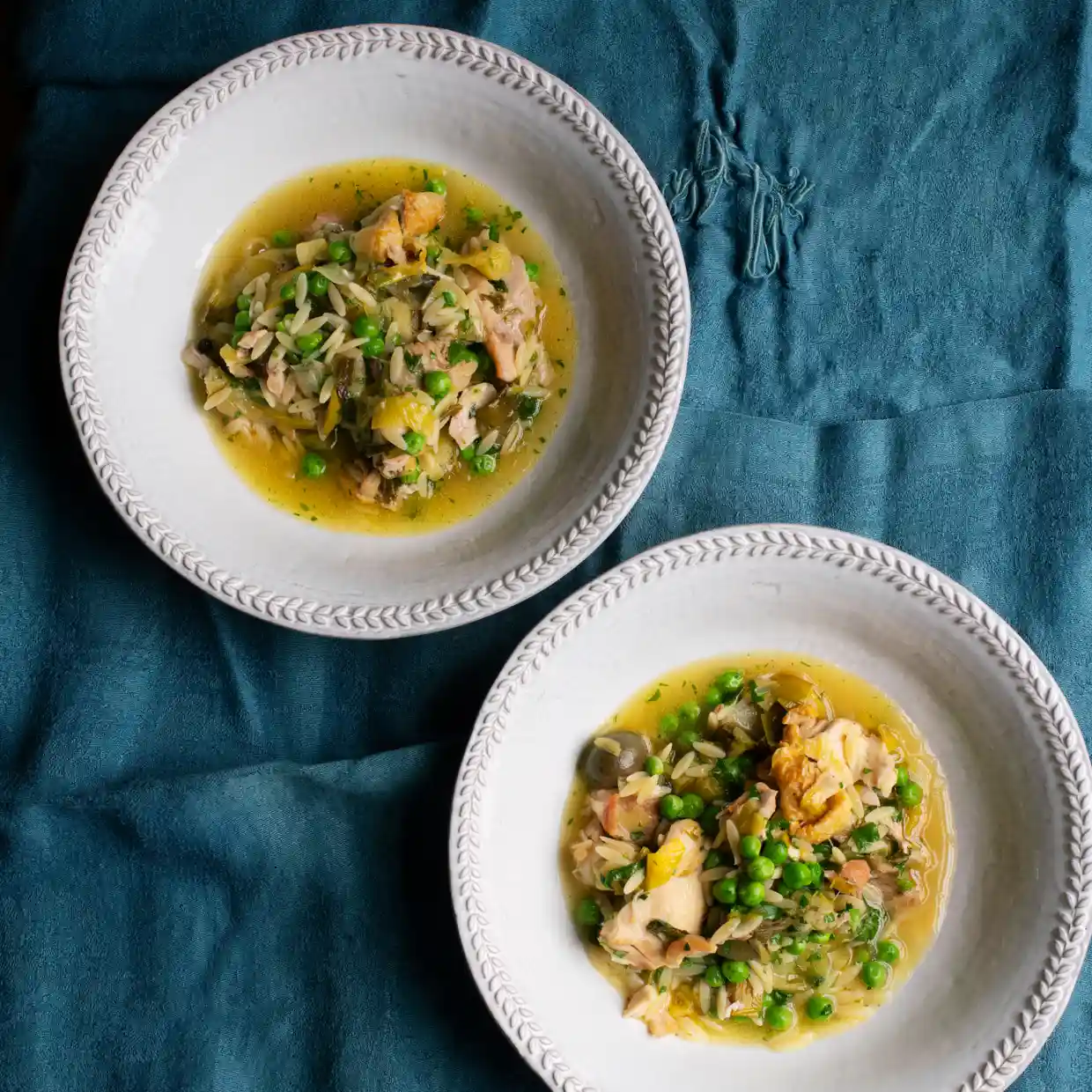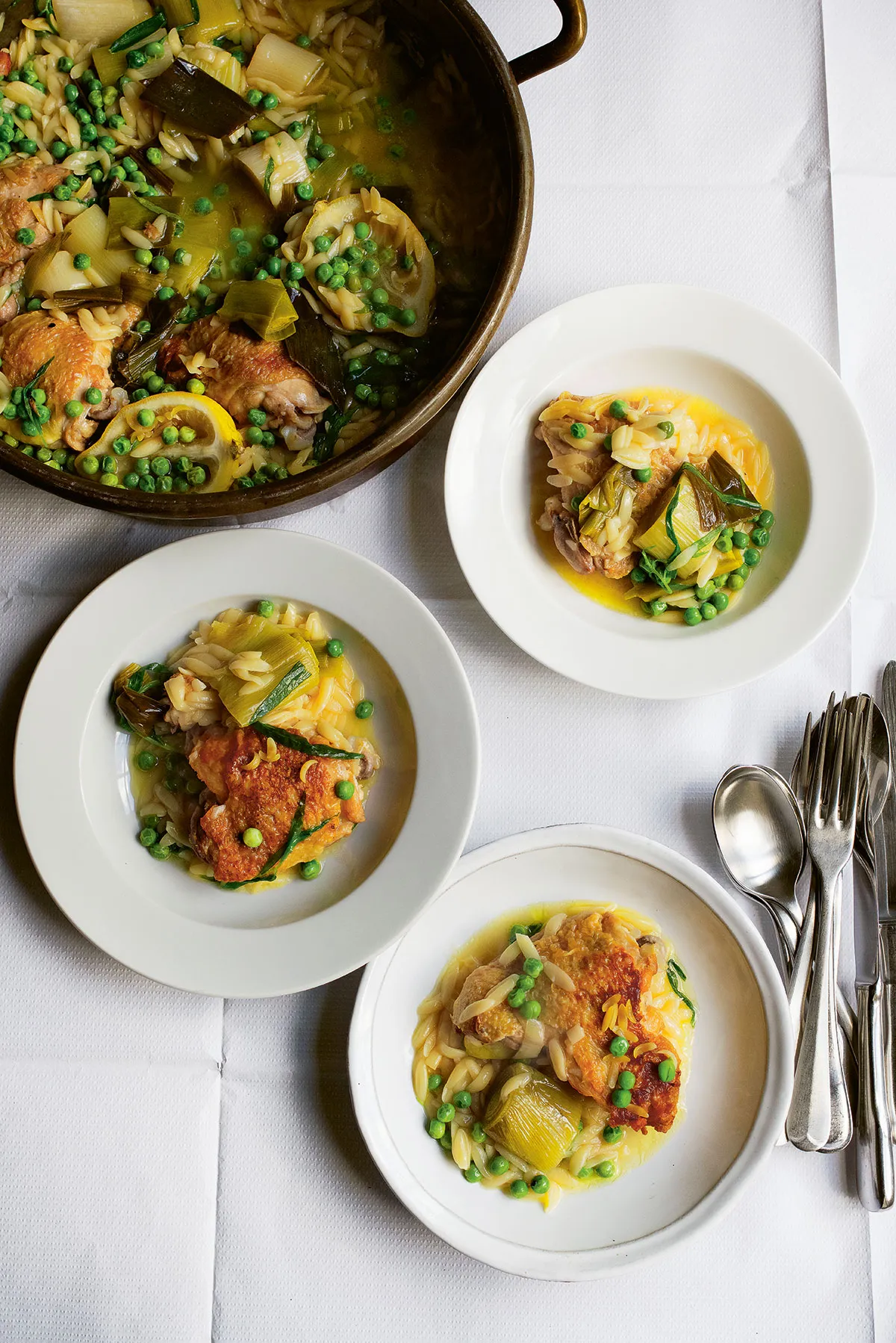"an urgent need for dishes that served to soothe rather than excite. " Nigel Slater

Nigella gets top billing again - this time with her Chicken in a pot with lemon and orzo, which she describes as "a simple one-pot dish that brings comfort and joy." And, as with the salted caramel, I'm beginning to wonder whether it's this dish that has brought back orzo to public attention, for ti seems to be very popular. However, what this post is about is more complicated than that.
I'm looking for comfort and ease, because I have been suffering all week - David too - with COVID. I'm not very ill I hasten to add but just a bit tired, unmotivated and uninspired. So apologies for the few not very stimulating words I have been writing this week.
As you know it's also a guru week, and I have been looking for something to cook from Elizabeth David's French Country Cooking. For a while there I considered the Poulet à la Sainte Ménéhoulde which I wrote about, but have eventually decided against it, although to be honest I'm not quite sure why. Possibly not quite soothing enough. Nigel Slater's words at the top of the page were written in the 2020 lockdown, and I feel a bit like that today. So I am now leaning more towards one of Elizabeth's two poulet au riz recipes - one relatively plain (and soothing) and one somewhat more complicated and robust - à la Basquaise.
So I'm sitting outside under the verandah, tapping away on my laptop, listening to the wind blowing, and the birds twittering, with the sun shining magnificently on the huge white candle bark tree in our garden. Pondering on chicken and rice. And orzo.

The orzo didn't actually come from reading Nigella or Elizabeth David. It came from reading through Rachel Roddy's A-Z of Pasta which I extravagantly treated myself to last week. Today I got to O - for Orzo amongst others, where she acknowledges the beauty of Nigella's recipe and reproduces it in her book. Here is her photograph. A little later along the line in presentation I guess, the chicken having been cut up and placed on top of the orzo.
Seeing this reminded me, however, of a vague and possibly erroneous, feeling that orzo is having a bit of a moment in the sun. Which is frankly a tiny bit amazing to me. I'm not a fan of orzo. It's alright in soup - just a little - but as an accompanying pasta I find it slimy. Not silky, or creamy as many often describe it. But then either I may have overcooked it, or my taste is different to others. Of course I would hardly say that I am fully up to date with food trends. I glean food news from supermarket magazines and The Guardian, and also being dimly aware of what is on supermarket shelves. I don't think I'm even aware of the best selling cookbooks as I only notice the ones I am interested in. And I certainly have no idea what is going on in the TikTok/Instagram world.

However I did think that Ottolenghi and co. were into Orzo - and so I checked my library to find that there were indeed a few - just a few recipes there, although none of them involved chicken. Online I found this one - One pot chicken with orzo, porcini and cinnamon - which I guess is, at least the same concept as Nigella. Just different flavours. There was one vegetarian - tomato - dish from Ixta Belfrage that I might consider one day, but not much else. Like I said I'm not a fan of orzo. Oh and the Recipe Tin Eats lady has three different takes on the topic as well.

Besides although even Rachel Roddy calls it orzo - orzo is actually Greek. And to be fair to her she does point this out. In Italy they call it either risoni, which is what you will find on the packets in the pasta aisle here, or rosamarino. Orzo, in Italian, means barley, which is another thing that some cooks suggest as an alternative in this kind of recipe. In Greece they cook it with lamb in a dish called Yiouvetsi as shown here in this version from Gourmet Traveller. But I shall not go further into Greek traditions, as I'm sure there's a whole other post there for another day.
Before we eventually circle back to Elizabeth David and rice, however, let's circle back to Nigel Slater and his experiments with orzo and chicken.
He seems to have had a couple of goes at it - Chicken soup with leeks and orzo and also
Braised chicken with leeks, orzo, peas, parsley. Which suggests it's really just a matter of how you cut up your chicken and how much liquid you use.
As soothing and comforting as he and Nigella might think these dishes are, however, I will not be going the orzo route, Besides Elizabeth David was not into orzo. She may not even have mentioned it anywhere. So let's return to the French, French Country Cooking and Poulet au riz. Rice is a much more attractive proposition for me, in spite of Nigella warning that if you use rice in her recipe - which you can - that if you do "it will be slightly puddingy cooked this way."

And here I will throw in another eminent, and alas, now dead, name - Richard Olney who said of the pilaf for that is what Poulet au riz, really is:
"People favour risottos now, but before there was risotto, there was pilaff: buttery rice mixed with onions, garlic and tomatoes that have first been fried in olive oil. If the tomatoes are good and fresh, the oil sufficiently grassy, and the onions just so, this is the food of the gods". The Observer Monthly

And here, on the right, photographed somewhat romantically on the terraces of Bonnieux in the Luberon in Provence at sunset is his version of Poulet au riz Provençal. Alas the recipe is not online, and neither is Elizabeth David's Poulet au riz which seems a little simpler - no tomatoes - more herbs. And I think that's what I shall be cooking.

Her Basquaise version is rather more complicated and richer - perhaps a little like the flavours of Anna Glover's Chicken cacciatore one-pot with orzo. Same kind of flavours but a different grain. And not Elizabeth David, so it's easy to go for rice rather than orzo.
Unless I change my mind again and go for the Sainte Ménéhoulde.


Kommentare